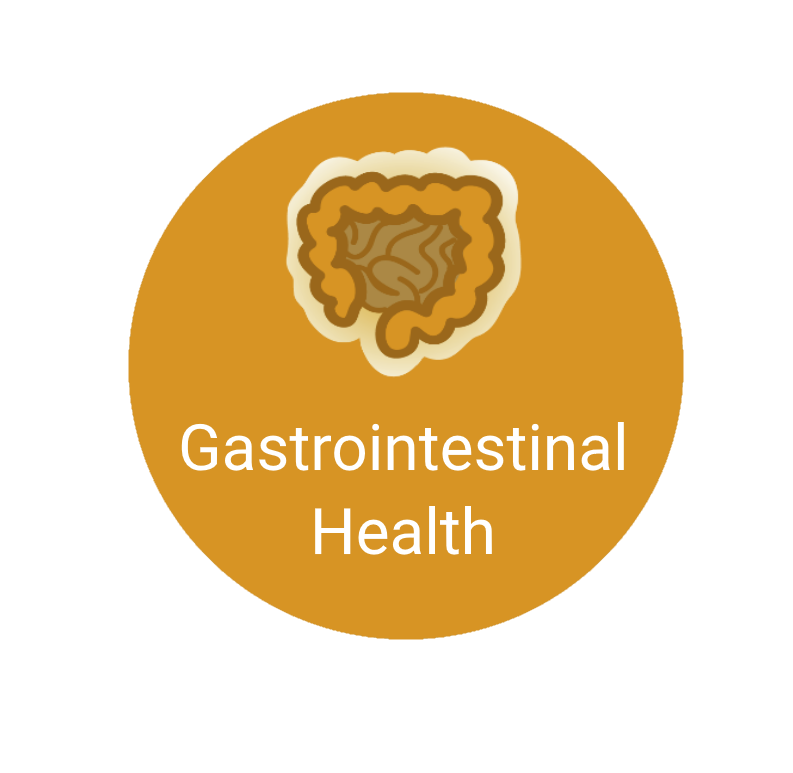
Our gut is extraordinary. It is made up of trillions of live bacteria (1) that help to not only digest food (2) but also play an important role in our overall health and wellbeing (2).
The key to preventing many health problems is to maintain a healthy gut. This is why it’s essential for us to consume foods and supplements that actively feed our gut with ‘friendly bacteria’ and fibre (3).
By delivering both, we reinforce the good bacteria in our guts whilst helping to shield ourselves from digestive problems, stress, poor immune defences, sleep issues and mood disorders.
To find out more about how diet and lifestyle can impact your gut health, click below.
-
Signs of an unhealthy gut
Stress
Stress is widely known to have a negative impact on gut bacteria (1). One study that focused on university students found that as their stress levels increased throughout the semester, certain health-promoting gut bacteria decreased (2). This is because immune cells act as messengers that convey psychological stress to the gut (3) and the heightened inflammation that stress triggers boosts pathogenic bacteria. As the name suggests, these aren’t the good guys and can cause what’s known as dysbiosis (damaged or impaired microflora) that affect the gut barrier (4).
Your gut and the brain constantly communicate through something called the gut-brain axis (5). If you think about how your stomach might ache whenever you feel nervous or anxious about something - that’s a classic example of how emotions and stress can perturb gut motility.
Sleep
This active brain-gut microbiome connection can also influence sleep quality. One study found that, microbiome diversity was positively correlated with increased sleep efficiency and total sleep time, but was negatively correlated with wake after sleep onset (6).
Mood
Digestive disorders such as Irritable Bowel Syndrome are a common response to low quality and low diverse gut microflora (7) and through the gut-brain axis, these conditions can negatively impact mood (8). Additionally, more than 90% of the key mood stabilizing hormone, serotonin, in the human body is produced in the gut, therefore it is conceivable that serotonin secreted by gut microflora can influence the level of serotonin in our brain and then affect behaviour and mood (9). Good bacteria in our guts are also known from the production of some beneficial substances which may exert a direct antidepressant-like effect (10).
Skin Health
Skin health issues can be a sign of an unhealthy gut. When inflammation occurs in the gut as a result of poor diet, this could cause the leaking of certain proteins that cause skin irritations (11).
A Place for Probiotics
While we can take on lifestyle changes to lessen the impact of health disorders on the gut, probiotics can also play an important role in supporting gut microflora and the healthy functioning of our guts (12). This dual strategy is a positive way to help improve gut health and create a healthy and diverse microbiome.
-
References
1. Molina-Torres G, Rodriguez-Arrastia M, Roman P, Sanchez-Labraca N, Cardona D. Stress and the gut microbiota-brain axis. Behav Pharmacol. 2019;30(2 and 3-Spec Issue):187-200.
2. Knowles SR, Nelson EA, Palombo EA. Investigating the role of perceived stress on bacterial flora activity and salivary cortisol secretion: a possible mechanism underlying susceptibility to illness. Biol Psychol. 2008;77(2):132-7.
3. Yang T, Ahmari N, Schmidt JT, Redler T, Arocha R, Pacholec K, et al. Shifts in the Gut Microbiota Composition Due to Depleted Bone Marrow Beta Adrenergic Signaling Are Associated with Suppressed Inflammatory Transcriptional Networks in the Mouse Colon. Front Physiol. 2017;8:220.
4. Zeng MY, Inohara N, Nuñez G. Mechanisms of inflammation-driven bacterial dysbiosis in the gut. Mucosal Immunol. 2017;10(1):18-26.
5. Cryan JF, O'Riordan KJ, Cowan CSM, Sandhu KV, Bastiaanssen TFS, Boehme M, et al. The Microbiota-Gut-Brain Axis. Physiol Rev. 2019;99(4):1877-2013.
6. Smith RP, Easson C, Lyle SM, Kapoor R, Donnelly CP, Davidson EJ, et al. Gut microbiome diversity is associated with sleep physiology in humans. PLoS One. 2019;14(10):e0222394.
7. Chong PP, Chin VK, Looi CY, Wong WF, Madhavan P, Yong VC. The Microbiome and Irritable Bowel Syndrome - A Review on the Pathophysiology, Current Research and Future Therapy. Front Microbiol. 2019;10:1136.
8. Mykletun A, Jacka F, Williams L, Pasco J, Henry M, Nicholson GC, et al. Prevalence of mood and anxiety disorder in self reported irritable bowel syndrome (IBS). An epidemiological population based study of women. BMC Gastroenterol. 2010;10:88.
9. Huang TT, Lai JB, Du YL, Xu Y, Ruan LM, Hu SH. Current Understanding of Gut Microbiota in Mood Disorders: An Update of Human Studies. Front Genet. 2019;10:98.
10. Smith PA. The tantalizing links between gut microbes and the brain. Nature. 2015;526(7573):312-4.
11. Salem I, Ramser A, Isham N, Ghannoum MA. The Gut Microbiome as a Major Regulator of the Gut-Skin Axis. Front Microbiol. 2018;9:1459.
12. Hemarajata P, Versalovic J. Effects of probiotics on gut microbiota: mechanisms of intestinal immunomodulation and neuromodulation. Therap Adv Gastroenterol. 2013;6(1):39-51.
-
Prebiotic Fibre
Probiotic 'Good Bacteria'
What are Prebiotics?
Prebiotics are substances that feed the good bacteria in our gut (3) and are mainly fibre, which is a substance our body cannot digest.
The gut microbiota is fed prebiotics and converts them into smaller and highly beneficial compounds in a process called fermentation (3). These compounds are called short-chain fatty acids (SCFAs) and are mainly known for:
- Regulating a normal function of the immune system (4-6)
- Maintaining a well-functioning gut wall (7-9)
- Creating a cosy environment for other friendly bacteria (10)
What is Bimuno® GOS
Bimuno® GOS is a prebiotic fibre that contains a unique mixture of galactooligosaccharides (GOS) which are derived from lactose. When consumed, it travels through our digestive system, until it reaches the large intestine. Once there, it feeds and stimulates the growth of good bacteria – particularly bifidobacteria (12-17) . These are among the first microbes to live in our gastrointestinal tract and are thought to have many positive health benefits (11).
The science behind Bimuno® GOS is one of the most comprehensive of any commercially available prebiotic on the market today.
Its safety and efficacy is supported by dozens of scientific publications, including human clinical trials (12-17).

Key Benefits from Clinical Studies



 Scientifically Proven
Scientifically Proven
-
Positive Changes in Gut Microflora
Clinical studies found that those who took Bimuno® GOS experienced:
- An increase in beneficial gut bacteria, especially bifidobacteria, (12-15, 17, 18). This effect was observed after consuming 1 serving (1.37 g) of Bimuno® GOS a day for 7 days (13).
- A decrease in potentially harmful gut bacteria. Studies showed this when Bimuno® GOS was taken for longer periods of time (at least 4 weeks (17)) and in a higher amount: 2 servings (2.74 g) a day (12, 15, 17)
-
Gastrointestinal Health
Research shows that Bimuno® GOS can improve gastrointestinal symptoms in undiagnosed adults who suffer with bloating, abdominal pain, or flatulence(19), as well as, those with Irritable Bowel Syndrome (IBS) (16, 17). Results were seen as quick as only 1 week of taking 1 serving a day (1.37 g) of Bimuno® GOS daily(16, 17, 19). The table below shows the reduction in symptoms across 1-2 weeks:
Less Bloating
Reduction in flatulence
Less abdominal pain
1 Week
51%
80%
76%
2 Weeks
98%
96%
92%
Figure 1. A proportion (%total) of subjects with gastrointestinal symptom relief to or below “present but tolerated” level during the treatment with Bimuno® GOS when compared to baseline (19).
Patients with IBS found that taking 1 serving a day of Bimuno® GOS was enough to relieve them from flatulence (17), abdominal pain (16), distension (16) and bloating (16, 17) by 4 weeks. When 2 servings(2.75 g) of Bimuno® were taken every day for 4 weeks, patient questionnaires showed that it had also helped to improve their anxiety and general quality of life (17).
Another study looked at how Bimuno® GOS could help to improve diarrhoea in people who travelled to countries of risk (20,21). Those who took 2 servings (2.74 g) of Bimuno® GOS a day for at least 5 days pre-holiday and during the whole holiday period, reported lower incidents of diarrhoea (20, 21) and a significantly lower duration compared to the control group (20).
Immune Health
When Bimuno® GOS reaches the large intestine, it can influence the composition and activities of bifidobacteria. Low levels of this health-positive bacterium could negatively affect the balance of microbes, develop potentially harmful bacterial groups and deteriorate immune responses (22). Taking Bimuno® GOS on a daily basis showed an improvement in some aspects of immunity including:
- Lower level of gut inflammation was found in overweight adults after taking 2 servings of Bimuno® GOS every day for 6 weeks. Whilst those who took the same daily intake over 12 weeks demonstrated lower inflammation levels across the whole body (12).
- Changes in the concentration of an intestinal protective antibody, called IgA. Results showed the presence of this antibody was significantly greater in overweight adults after they took 2 servings of Bimuno® GOS every day for 12 weeks (12).
- Lower inflammation level across the whole body in healthy elderly persons (15)
- Stimulation of some immune cells which are essential to immunity in healthy elderly persons (14, 15)
Moreover, beneficial results from taking 2 servings of Bimuno® GOS after 5 weeks included:Stress Relief and Cognitive Health
Studies have shown that consuming 2 servings a day of Bimuno® GOS for 3 weeks was associated with decreased cortisol awakening reactivity (23) – a recognized indicator of stress/anxiety, that is normally increased by work stressors (24) and in people who are at risk of developing depression (25).
Additionally, participants who received 2 servings of Bimuno® GOS for 3 weeks showed increased attention to positive stimuli (23), which further proves their lower stress/anxiety level after treatment with Bimuno® GOS.
Bimuno® is a registered trademark of Clasado IP Limited.
What are Probiotics?
Probiotics are good microorganisms including some bacteria or yeasts that help keep our body healthy and working well (26,27). So far, the most widely known probiotics are Bifidobacterium and Lactobacillus species that can inhibit the development of some pathogens, positively change our gut microbiota and boost the generation of highly beneficial substances from fibre containing food (49-51).
There is increasing evidence of the beneficial effects that these and many other probiotics may exert including:
- Improved intestinal health (28)
- Enhanced immune health (29)
- Positive influence on cognitive health (30, 31)
- Reduction in cholesterol (32, 33)
What is Bifidobacterium lactis HN019™?
B. lactis HN019™ is a probiotic bacteria originally isolated from a yogurt produced in New Zealand and has been consumed as part of dairy products for decades.
B. lactis HN019™ has been proven to successfully pass through our digestive system (34) and has been used both, as a single strain and in combination with other probiotics and prebiotics in many human clinical trials (35-48). These trials have included children, adults and the elderly.

Key Benefits from Clinical Studies


 Scientifically Proven
Scientifically Proven
-
Gastrointestinal Health
B. lactis HN019™ has been shown to alleviate gastrointestinal issues and support gut movements.
One study focused on individuals with constipation after consuming 1 serving (min. 1 billion CFU) of B. lactis HN019™ every day for a month, and showed an improvement in bowel movements(40).
Improvements in gut transit time were also witnessed in those who suffered with gastrointestinal symptoms over the 14-day study period, who consumed a minimum of 1.8 billion CFU (2 servings) B. lactis HN019™(41).
In just 14 days, there were noticeable improvements in gastrointestinal symptoms when taking either 1 or 2 servings of B. lactis HN019™ per day(41). The higher dose (2 servings) appeared to help reduce 8 out of 9 of the gastrointestinal symptoms, while the lower dose (1 serving) showed a significant improvement on 7 out of 9 symptoms(41).
These results suggest B. lactis HN019™ can promote gut regularity naturally and safely.
-
Immune Health
A study focused on people over the age of 41 to see if consuming B. lactis HN019™ would stimulate some immune cells that play a key role in immune defences. They took 2 servings (2 billion CFU) of B. lactis HN019™ every day for at least 3 weeks with the results showing significantly greater improvements in the activity of some immune cells (39).
-
References
- Sender R, Fuchs S, Milo R. Revised Estimates for the Number of Human and Bacteria Cells in the Body. PLoS Biol. 2016;14(8):e1002533.
- Shreiner AB, Kao JY, Young VB. The gut microbiome in health and in disease. Curr Opin Gastroenterol. 2015;31(1):69-75.
- Davani-Davari D, Negahdaripour M, Karimzadeh I, Seifan M, Mohkam M, Masoumi SJ, et al. Prebiotics: Definition, Types, Sources, Mechanisms, and Clinical Applications. Foods. 2019;8(3).
- Yang W, Yu T, Huang X, Bilotta AJ, Xu L, Lu Y, et al. Intestinal microbiota-derived short-chain fatty acids regulation of immune cell IL-22 production and gut immunity. Nat Commun. 2020;11(1):4457.
- Meijer K, de Vos P, Priebe MG. Butyrate and other short-chain fatty acids as modulators of immunity: what relevance for health? Curr Opin Clin Nutr Metab Care. 2010;13(6):715-21.
- Zou J, Chassaing B, Singh V, Pellizzon M, Ricci M, Fythe MD, et al. Fiber-Mediated Nourishment of Gut Microbiota Protects against Diet-Induced Obesity by Restoring IL-22-Mediated Colonic Health. Cell Host Microbe. 2018;23(1):41-53.e4.
- Willemsen LE, Koetsier MA, van Deventer SJ, van Tol EA. Short chain fatty acids stimulate epithelial mucin 2 expression through differential effects on prostaglandin E(1) and E(2) production by intestinal myofibroblasts. Gut. 2003;52(10):1442-7.
- Goverse G, Molenaar R, Macia L, Tan J, Erkelens MN, Konijn T, et al. Diet-Derived Short Chain Fatty Acids Stimulate Intestinal Epithelial Cells To Induce Mucosal Tolerogenic Dendritic Cells. J Immunol. 2017;198(5):2172-81.
- Schroeder BO, Birchenough GMH, Ståhlman M, Arike L, Johansson MEV, Hansson GC, et al. Bifidobacteria or Fiber Protects against Diet-Induced Microbiota-Mediated Colonic Mucus Deterioration. Cell Host Microbe. 2018;23(1):27-40.e7.
- Byndloss MX, Olsan EE, Rivera-Chávez F, Tiffany CR, Cevallos SA, Lokken KL, et al. Microbiota-activated PPAR-γ signaling inhibits dysbiotic Enterobacteriaceae expansion. Science. 2017;357(6351):570-5.
- O'Callaghan A, van Sinderen D. Bifidobacteria and Their Role as Members of the Human Gut Microbiota. Front Microbiol. 2016;7:925.
- Vulevic J, Juric A, Tzortzis G, Gibson GR. A mixture of trans-galactooligosaccharides reduces markers of metabolic syndrome and modulates the fecal microbiota and immune function of overweight adults. J Nutr. 2013;143(3):324-31.
- Depeint F, Tzortzis G, Vulevic J, I'anson K, Gibson GR. Prebiotic evaluation of a novel galactooligosaccharide mixture produced by the enzymatic activity of Bifidobacterium bifidum NCIMB 41171, in healthy humans: a randomized, double-blind, crossover, placebo-controlled intervention study. Am J Clin Nutr. 2008;87(3):785-91.
- Vulevic J, Juric A, Walton GE, Claus SP, Tzortzis G, Toward RE, et al. Influence of galacto-oligosaccharide mixture (B-GOS) on gut microbiota, immune parameters and metabonomics in elderly persons. Br J Nutr. 2015;114(4):586-95.
- Vulevic J, Drakoularakou A, Yaqoob P, Tzortzis G, Gibson GR. Modulation of the fecal microflora profile and immune function by a novel trans-galactooligosaccharide mixture (B-GOS) in healthy elderly volunteers. Am J Clin Nutr. 2008;88(5):1438-46.
- Huaman JW, Mego M, Manichanh C, Cañellas N, Cañueto D, Segurola H, et al. Effects of Prebiotics vs a Diet Low in FODMAPs in Patients With Functional Gut Disorders. Gastroenterology. 2018;155(4):1004-7.
- Silk DB, Davis A, Vulevic J, Tzortzis G, Gibson GR. Clinical trial: the effects of a trans-galactooligosaccharide prebiotic on faecal microbiota and symptoms in irritable bowel syndrome. Aliment Pharmacol Ther. 2009;29(5):508-18.
- Grimaldi R, Gibson GR, Vulevic J, Giallourou N, Castro-Mejía JL, Hansen LH, et al. A prebiotic intervention study in children with autism spectrum disorders (ASDs). Microbiome. 2018;6(1):133.
- Vulevic J, Tzortzis G, Juric A, Gibson GR. Effect of a prebiotic galactooligosaccharide mixture (B-GOS®) on gastrointestinal symptoms in adults selected from a general population who suffer with bloating, abdominal pain, or flatulence. Neurogastroenterol Motil. 2018;30(11):e13440.
- Drakoularakou A, Tzortzis G, Rastall RA, Gibson GR. A double-blind, placebo-controlled, randomized human study assessing the capacity of a novel galacto-oligosaccharide mixture in reducing travellers' diarrhoea. Eur J Clin Nutr. 2010;64(2):146-52.
- Hasle G, Raastad R, Bjune G, Jenum PA, Heier L. Can a galacto-oligosaccharide reduce the risk of traveller's diarrhoea? A placebo-controlled, randomized, double-blind study. J Travel Med. 2017;24(5).
- O'Neill I, Schofield Z, Hall L. Explre the role of the microbiota member Bifidobacterium in modulating immune-linked diseases. Emerg Top Life Sci . 2017 Nov 30; 1(4): 333–349.
- Schmidt K, Cowen PJ, Harmer CJ, Tzortzis G, Errington S, Burnet PW. Prebiotic intake reduces the waking cortisol response and alters emotional bias in healthy volunteers. Psychopharmacology (Berl). 2015;232(10):1793-801.
- Kunz-Ebrecht SR, Kirschbaum C, Marmot M, Steptoe A. Differences in cortisol awakening response on work days and weekends in women and men from the Whitehall II cohort. Psychoneuroendocrinology. 2004;29(4):516-28.
- Mannie ZN, Harmer CJ, Cowen PJ. Increased waking salivary cortisol levels in young people at familial risk of depression. Am J Psychiatry. 2007;164(4):617-21.
- FAO/WHO. Guidelines for the Evaluation of Probiotics in Food. 2002.
- Hill C, Guarner F, Reid G, Gibson GR, Merenstein DJ, Pot B, et al. The International Scientific Association for Probiotics and Prebiotics consensus statement on the scope and appropriate use of the term probiotic. Nature Reviews Gastroenterology & Hepatology 11, 506-514(2014); 2014.
- Sanders ME, Merenstein DJ, Reid G, Gibson GR, Rastall RA. Probiotics and prebiotics in intestinal health and disease: from biology to the clinic. Nat Rev Gastroenterol Hepatol. 2019;16(10):605-16.
- Ashraf R, Shah NP. Immune system stimulation by probiotic microorganisms. Crit Rev Food Sci Nutr. 2014;54(7):938-56.
- Ruiz-Gonzalez C, Roman P, Rueda-Ruzafa L, Rodriguez-Arrastia M, Cardona D. Effects of probiotics supplementation on dementia and cognitive impairment: A systematic review and meta-analysis of preclinical and clinical studies. Prog Neuropsychopharmacol Biol Psychiatry. 2020:110189.
- Kim CS, Cha L, Sim M, Jung S, Chun WY, Baik HW, et al. Probiotic Supplementation Improves Cognitive Function and Mood with Changes in Gut Microbiota in Community-Dwelling Older Adults: A Randomized, Double-Blind, Placebo-Controlled, Multicenter Trial. J Gerontol A Biol Sci Med Sci. 2021;76(1):32-40.
- Cho YA, Kim J. Effect of Probiotics on Blood Lipid Concentrations: A Meta-Analysis of Randomized Controlled Trials. Medicine (Baltimore). 2015;94(43):e1714.
- Wang L, Guo MJ, Gao Q, Yang JF, Yang L, Pang XL, et al. The effects of probiotics on total cholesterol: A meta-analysis of randomized controlled trials. Medicine (Baltimore). 2018;97(5):e9679.
- Prasad, J., Sazawal S, Dhingra U, Gopal P. Detection of viable Bifidobacterium lactis HN019 (DR10™) in stools of children during a synbiotic dietary intervention trial. Int Dairy J, 30(2):64-67
- Bernini LJ, Simão AN, Alfieri DF, Lozovoy MA, Mari NL, de Souza CH, et al. Beneficial effects of Bifidobacterium lactis on lipid profile and cytokines in patients with metabolic syndrome: A randomized trial. Effects of probiotics on metabolic syndrome. Nutrition. 2016;32(6):716-9.
- Gill HS, Rutherfurd KJ, Cross ML. Dietary probiotic supplementation enhances natural killer cell activity in the elderly: an investigation of age-related immunological changes. J Clin Immunol. 2001;21(4):264-71.
- Gill HS, Rutherfurd KJ, Cross ML, Gopal PK. Enhancement of immunity in the elderly by dietary supplementation with the probiotic Bifidobacterium lactis HN019. Am J Clin Nutr. 2001;74(6):833-9.
- Arunachalam K, Gill HS, Chandra RK. Enhancement of natural immune function by dietary consumption of Bifidobacterium lactis (HN019). Eur J Clin Nutr. 2000;54(3):263-7.
- Chiang BL, Sheih YH, Wang LH, Liao CK, Gill HS. Enhancing immunity by dietary consumption of a probiotic lactic acid bacterium (Bifidobacterium lactis HN019): optimization and definition of cellular immune responses. Eur J Clin Nutr. 2000;54(11):849-55.
- Ibarra A, Latreille-Barbier M, Donazzolo Y, Pelletier X, Ouwehand AC. Effects of 28-day Bifidobacterium animalis subsp. lactis HN019 supplementation on colonic transit time and gastrointestinal symptoms in adults with functional constipation: A double-blind, randomized, placebo-controlled, and dose-ranging trial. Gut Microbes. 2018;9(3):236-51.
- Waller PA, Gopal PK, Leyer GJ, Ouwehand AC, Reifer C, Stewart ME, et al. Dose-response effect of Bifidobacterium lactis HN019 on whole gut transit time and functional gastrointestinal symptoms in adults. Scand J Gastroenterol. 2011;46(9):1057-64.
- Ahmed M, Prasad J, Gill H, Stevenson L, Gopal P. Impact of consumption of different levels of Bifidobacterium lactis HN019 on the intestinal microflora of elderly human subjects. J Nutr Health Aging. 2007;11(1):26-31.
- Wickens K, Black PN, Stanley TV, Mitchell E, Fitzharris P, Tannock GW, et al. A differential effect of 2 probiotics in the prevention of eczema and atopy: a double-blind, randomized, placebo-controlled trial. J Allergy Clin Immunol. 2008;122(4):788-94.
- Wibowo N, Bardosono S, Irwinda R. Effects of Bifidobacterium animalis lactis HN019 (DR10TM), inulin, and micronutrient fortified milk on faecal DR10TM, immune markers, and maternal micronutrients among Indonesian pregnant women. Asia Pac J Clin Nutr. 2016;25(Suppl 1):S102-S10.
- Stratiki Z, Costalos C, Sevastiadou S, Kastanidou O, Skouroliakou M, Giakoumatou A, et al. The effect of a bifidobacter supplemented bovine milk on intestinal permeability of preterm infants. Early Hum Dev. 2007;83(9):575-9.
- Dilli D, Aydin B, Fettah ND, Özyazıcı E, Beken S, Zenciroğlu A, et al. The propre-save study: effects of probiotics and prebiotics alone or combined on necrotizing enterocolitis in very low birth weight infants. J Pediatr. 2015;166(3):545-51.e1.
- Gopal, P.K., Prasad J, Gill HS. Effects of the consumption of Bifidobacterium lactis HN019 (DR10TM) and galacto-oligosaccharides on the microflora of the gastrointestinal tract in human subjects. Nutrition research (New York, N.Y.), 23(10), pp.1313–1328.
- Dekker, J.W., al. e. Safety aspects of probiotic bacterial strains Lactobacillus rhamnosus HN001 and Bifidobacterium animalis subsp. lactis HN019 in humaninfants aged 0–2 years. International Dairy Journal, 19(3), pp.149–154.
- Azad MAK, Sarker M, Li T, Yin J. Probiotic Species in the Modulation of Gut Microbiota: An Overview. Biomed Res Int. 2018;2018:9478630.
- Markowiak-Kopeć P, Śliżewska K. The Effect of Probiotics on the Production of Short-Chain Fatty Acids by Human Intestinal Microbiome. Nutrients. 2020;12(4).
- Di Cerbo A, Palmieri B, Aponte M, Morales-Medina JC, Iannitti T. Mechanisms and therapeutic effectiveness of lactobacilli. J Clin Pathol. 2016;69(3):187-203.
HOWARU® is a registered trademark of International Flavors and Fragrances Inc. or its affiliates.
HN019™ is a trademark of the Fonterra Group of companies used under license.
This website and the content on it have been developed and made available for the sole purpose of providing educational information and must not be treated or viewed as marketing material. The statements made on the website have not been evaluated by any regulatory body. The information on benefits are specifically linked to the related ingredients and have been proven and supported by scientific evidence and research. The content on this website must not be hyperlinked to, copied, reproduced or otherwise distributed, in whole or in part. No action should be taken in reliance on the content.